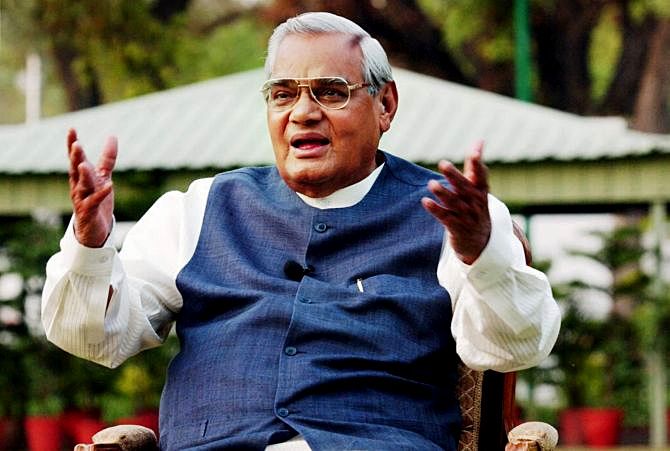Atalji witnessed many lows in his life.
With these, says Syed Firdaus Ashraf, come lessons that can help you in your life.

1. Your birth place does not define your future
Don't let it bother you if you were not born in a big city like Mumbai or Delhi.
Atal Bihari Vajpayee was born in Gwalior and went on to become the prime minister of India three times (May 16, 1996 to June 1, 1996, 1998 to 1999 and 1999 to 2004).
2. Your future is not dependent on what your parents did for a living.
Your parents may not be rich and powerful, but why should you let that dull your dreams?
Vajpayee's father Krishna Bihari Vajpayee was a schoolmaster, his mother Krishna Devi a housewife.
3. Believe in what you believe
A year after India won its freedom, the Rashtriya Swayamsevak Sangh was banned.
Vajpayee, a member of the RSS, never gave up on his ideology.
He was a founder member of the Bharatiya Jan Sangh (the political parent of the Bharatiya Janata Party).
After the Jan Sangh became part of the Janata Party, the issue of dual membership was raised.
Vajpayee and other former Jan Sangh ministers in Morarji Desai's Janata Party government were told to give up their membership of the RSS, but they refused to abandon the RSS.
Like Vajpayee, don't let the world's opinion affect you.
If you believe in something, stick with it even if the world thinks you are wrong.
4. No mentor? Don't let it hamper you
Syama Prasad Mookerjee -- who founded the Jan Sangh -- died mysteriously in Kashmir in 1953.
Vajpayee was 29 years old when he lost his mentor.
Even as he mourned Mookerjee's untimely death, Vajpayee carried on his party work with other leaders like Deen Dayal Upadhyay and L K Advani.
Having a mentor can make your path easier, but, like Vajpayee, you can forge ahead even if you don't have one.
5. Be patient, success will come
The BJP was reduced to 2 seats in the 1984 Lok Sabha election.
Vajpayee -- who lost that election -- stayed politically relevant even though he was sidelined by Advani who gave the BJP a fresh lease of life by propping up the Ram Janambhoomi issue.
As Advani gained ascendance, Vajpayee may have appeared an also-ran, but stayed loyal to his party.
Advani realised if the BJP won enough seats to form a government after the 1996 general election, it would need Vajpayee's appeal to win allies.
He stepped aside and at the BJP's national convention in Mumbai in 1995, Atal Bihari Vajpayee was anointed as the BJP's prime ministerial candidate.
Remember, if you feel all is lost, don't give up.
Continue to work hard, and know a time will come when you will reap your just rewards.
6. Know when to cut your losses
In the 1996 Lok Sabha election, the BJP won 161 seats and emerged as the single largest party. But it was short of 111 seats still needed to form a government.
The BJP could not prove its majority on the floor of the House.
So, within 13 days of forming the government, Vajpayee resigned as prime minister.
When faced with a difficult situation, it is sometimes better to withdraw so that you can return to fight and succeed another day.
7. Learn from the past
In the 1998 election, the BJP won 182 seats. Again, it was short of a majority.
This time, Vajpayee knew what he had to do.
He cobbled together an alliance with 13 partners under the banner of the National Democratic Alliance and went on to form the government.
If you don't succeed once, it does not mean you will not succeed again.
Plan carefully and gather together people who will support you in your endeavour.
8. Don't be afraid of taking bold decisions
A few months after he became prime minister a second time, Vajpayee decided India needed to conduct a second nuclear test.
He planned for the international political fallout of his decision so that the impact on India did not damage the nation.
During the Kargil war in 1999, he remained firm that India would not give into Pakistan's aggression and cede territory.
When it is necessary, it is important to take a stand for what you value.
At this time, you may need to make some hard decisions. Don't shy away from the responsibility.
9. Can issues be resolved peacefully? Try your best
Despite his best intentions, Vajpayee was twice betrayed by Pakistan, but did not give up on his dream of a harmonious relationship with India's neighbour.
In February 1999, he traveled by bus to Lahore to talk peace, but got the Kargil war in return.
In July 2001, he invited Pakistan's military dictator General Pervez Musharraf for a summit in Agra to once again discuss peace. In December that year, Parliament was attacked.
Vajpayee persevered and visited Pakistan in 2003 for the SAARC summit.
If the goal is important enough, keep trying.
India may not have succeeded in making peace with Pakistan, but it is possible that you will achieve your goal.
10. Never give up
In 1998, the Vajpayee government lost the no-confidence motion by a single vote.
Vajpayee refused to give up.
The BJP contested the 1999 election with vigour and won.
Sometimes, all you need is belief, gumption and hard work. That will lead you to success.










